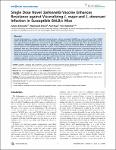Single Dose Novel Salmonella Vaccine Enhances Resistance against Visceralizing L. major and L. donovani Infection in Susceptible BALB/c Mice.
Schroeder, Juliane
Brown, Najmeeyah
Kaye, Paul
Aebischer, Toni
Visceral leishmaniasis is a major neglected tropical disease, with an estimated 500,000 new cases and more than 50,000 deaths attributable to this disease every year. Drug therapy is available but costly and resistance against several drug classes has evolved. Despite all efforts, no commercial, let alone affordable, vaccine is available to date. Thus, the development of cost effective, needle-independent vaccines is a high priority. Here, we have continued efforts to develop live vaccine carriers based on recombinant Salmonella. We used an in silico approach to select novel Leishmania parasite antigens from proteomic data sets, with selection criteria based on protein abundance, conservation across Leishmania species and low homology to host species. Five chosen antigens were differentially expressed on the surface or in the cytosol of Salmonella typhimurium SL3261. A two-step procedure was developed to select optimal Salmonella vaccine strains for each antigen, based on bacterial fitness and antigen expression levels. We show that vaccine strains of Salmonella expressing the novel Leishmania antigens LinJ08.1190 and LinJ23.0410 significantly reduced visceralisation of L. major and enhanced systemic resistance against L. donovani in susceptible BALB/c mice. The results show that Salmonella are valid vaccine carriers for inducing resistance against visceral leishmaniasis but that their use may not be suitable for all antigens.
Dateien zu dieser Publikation
Keine Lizenzangabe
Verwandte Publikationen
Anzeige der Publikationen mit ähnlichem Titel, Autor, Urheber und Thema.
-
2011-01-01ZeitschriftenartikelVaccines for Leishmaniasis: From proteome to vaccine candidates Schroeder, Juliane; Aebischer, ToniLeishmania spp. cause a wide spectrum of tropical diseases which are threatening an estimated 350 million people around the globe. While in most cases non-fatal, the disease is associated with high morbidity, social stigmata ...
-
2011-09-14ZeitschriftenartikelInfluenza B Virus With Modified Hemagglutinin Cleavage Site as a Novel Attenuated Live Vaccine Stech, Jürgen; Garn, Holger; Herwig, Astrid; Stech, Olga; Dauber, Bianca; Wolff, Thorsten; Mettenleiter, Thomas C.; Klenk, Hans-DieterBackground: Both pandemic and interpandemic influenza is associated with high morbidity and mortality worldwide. Seasonal epidemics are caused by both influenza A and B virus strains that cocirculate with varying predominance ...
-
2009-07-22ZeitschriftenartikelMeasles viruses of genotype H1 evade recognition by vaccine-induced neutralizing antibodies targeting the linear haemagglutinin noose epitope Finsterbusch, Tim; Wolbert, Anne; Deitemeier, Ingrid; Meyer, Kerstin; Mosquera, Maria Mar; Mankertz, Annette; Santibanez, SabineThe linear haemagglutinin noose epitope (HNE; aa 379-410) is a protective B-cell epitope and considered to be highly conserved in both the vaccine and the wild-type measles virus (MeV) haemagglutinin (H) proteins. Vaccine ...

